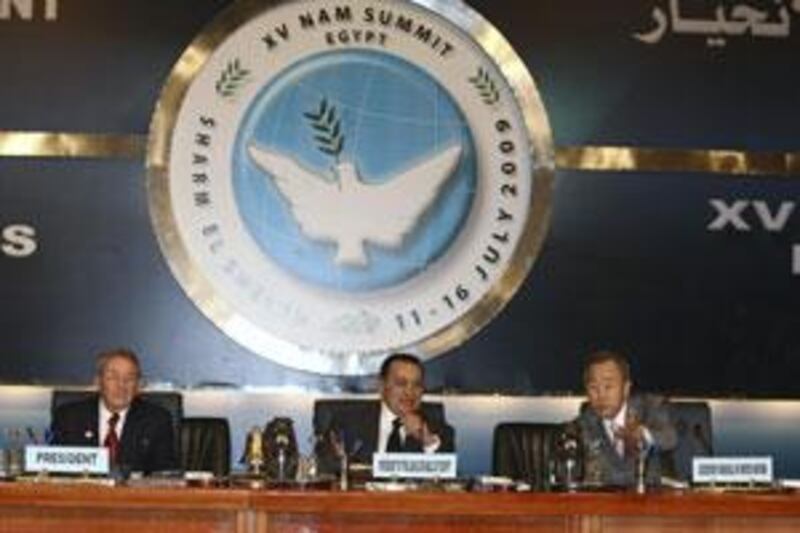SHARM EL SHEIKH, EGYPT // The global economic crisis dominated the opening day of the 15th Non-Aligned Movement (NAM) summit in the Red Sea resort town of Sharm El Sheikh yesterday, with most speakers blaming it on wealthy countries. "The rich countries are the source of this current crisis," said the Cuban President Raúl Castro in his address at the opening session of the two-day summit. "The current crisis won't be solved by apparent or cosmetic solutions that are trying to maintain the current financial system.
"We demand the establishment of a new international financial and economic structure that relies on the participation of all countries," said Mr Castro, the outgoing president of the NAM. "There must be a new framework that doesn't depend solely on the economic stability and the political decision of only one country," he added, in apparent reference to the United States. The Cuban leader handed the presidency of the movement to Egyptian President Hosni Mubarak. Egypt, one of the founders of the movement in 1961, will head the group until 2012 at which point the presidency will go to Iran.
The 118-nation NAM was born during the Cold War almost 50 years ago as a group of countries that is neither allied with the US-led camp or the Soviet bloc. However, the movement has lost much of its relevance since the end of the Cold War nearly two decades ago. Made up mostly of African, Asian and Latin American nations, it has since become primarily an international speaking forum for developing nations.
Mr Mubarak made reference to this in his speech: "Keeping the goals and principles which the movement was founded on represents a challenge and a constant need to actively deal with the new realities in international relations. "We are all living the reality of the problems of growth and development in our countries, confronting the difficulties and challenges of the inside [the NAM] and international crises that are coming to us from abroad," he said.
"We are calling for a new international political, economic and trade order." Omar al Bashir, the Sudanese president, concurred. "Our meeting is taking place at a particularly complex conjuncture, characterised by the worst global economic and financial crisis of serious gravity and magnitude since the great depression [of the 1930s]," he said in his speech. Ban Ki-Moon, the UN secretary general, said in a speech that poorer countries had borne the brunt of the crisis. "All countries are feeling the effects, but some developing countries are suffering most, including millions of people living in the NAM states. The impact will likely be even graver in the future," he said.
Political criticisms were also voiced at the summit. The Libyan leader Moammar Qadafi criticised the UN Security Council, which he said was dominated by the US and was akin to "a train that had left its rails", and suggested NAM states establish a security council of their own. Unlike the position of Egypt, the Libyan leader took aim at those countries criticising Iran for pursuing a nuclear programme for having the "wrong stance", adding that any progress in Iran's uranium enrichment programme "should be encouraged as a scientific gain".
Mahmoud Ahmadinejad, the Iranian president, did not show up for the summit and Iran was instead represented by its foreign minister, Manouchehr Mottaki, who has held three meetings since July 11 with his Egyptian counterpart, Ahmed Aboul Gheit, despite tense relations between the two competing regional heavyweights. Mr Aboul Gheit did not rule out an "improvement in the relations between the two countries in the coming three years".
The tension between the two countries goes back three decades, when the Iranian monarchy was replaced by the Islamic revolution in February 1979, and Egypt gave refuge to the deposed Shah. Relations worsened later that year when the late Egyptian president Anwar Sadat signed a peace treaty with Israel. Mr Qadafi, who is the head of the African Union, questioned the international definition of terrorism, and asked why the world considers "a man with a bomb or an explosive belt a terrorist while we are living in the shadow of terrorism of the International Monetary Fund and World Bank".
He also called on NAM members to close any military bases on their territories. Among the clauses mentioned in the final draft declaration, to be adopted by the leaders of NAM today, is disarmament and international security, human rights and democracy, self determination, the situation in the Middle East - the core of which is the Israeli-Palestinian conflict - the special needs of Africa, and enhancing dialogue among civilisations and religions.
India's prime minister, Manmohan Singh, in his speech yesterday referred to Jawaharlal Nehru, the first Indian prime minister and founding member of NAM. Mr Singh said Nehru's belief was that "the power of nations assembled here is not military power or economic power, nevertheless it is power. Call it moral force. These words hold true even today". "No non-aligned summit has ever been held in an economic and financial crisis of this magnitude that now grips the world," he said. "The relevance of NAM has, hence, never been greater than today. Co-operation, trade and investment among our countries can contribute significantly to reviving the world economy."
Mr Singh was to meet with his Pakistani counterpart, Yousaf Raza Gilani, today in the hope of restarting talks between the two countries. Relations between India and Pakistan were strained by the terror attacks in Mumbai last November, which India blames of the Pakistan-based militant group Lashkar-i-Taiba. nmagd@thenational.ae





